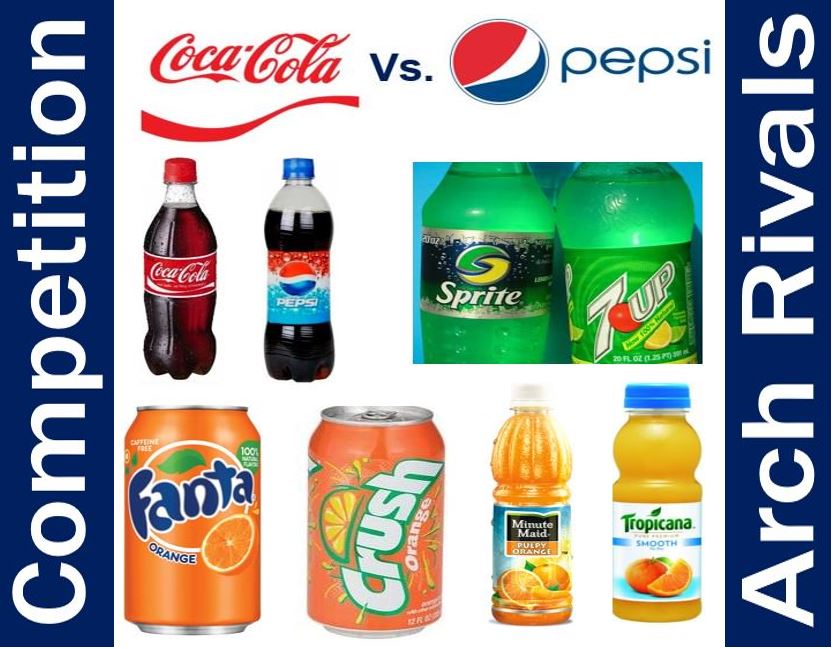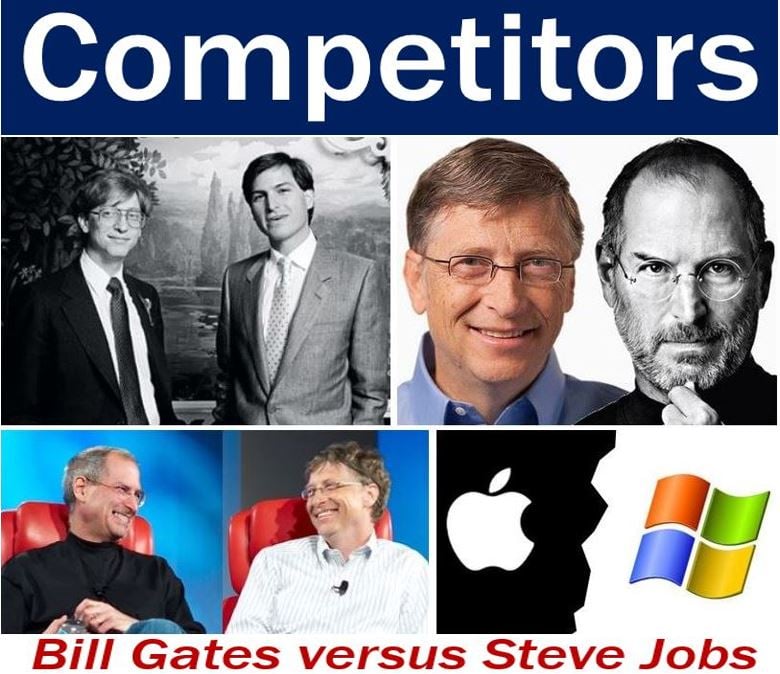A Competitor is a person, business, team, or organization that competes against you or your company. If somebody is trying to beat you in a race, that person is your competitor.
We do not just use the term ‘competitor’ in business. Competitors also exist in sports, politics, acting, music, literature, etc.
In business, we call a close competitor a rival. In other words, rivals are the same size and make similar products.
If two companies are leaders in their field, we refer to them as arch rivals. Beverage giants Coca-Cola and PepsiCo make virtually identical products and have a very similar market share. Coca-Cola and Pepsico are arch rivals.
In December 2005, for the first time in 112 years, PepsiCo surpassed its arch rival Coca-Cola in market value.
Competitor – targeting customers
Competitors not only make similar products but also sell them at similar prices. For example, in the car market, Ford is a competitor of Toyota.
In fact, Toyota and Rolls Royce are not competitors. Even though they both make and sell cars, they are not targeting the same customers. They sell their cars at vastly different prices.
Competitors form a vital part of a free-market economy. Their presence in an industry helps drive down the prices of goods and services.

Competition is good for consumers
If a competitor has to compete to gain market share, the winner is the consumer. The consumer wins because competition ensures top quality.
If two companies offer similar products at similar prices, quality will determine what the customer buys.
If a company has no competitor, it has a market monopoly. Monopolies are common in a command economy (communism). They also exist in a free market where the sole company either destroyed its competitors or acquired them.
To prevent monopolies, most free-market democracies have government regulators. These regulators either approve or turn down major mergers and acquisitions from going ahead.
In the United States, the Federal Trade Commission’s Bureau of Competition enforces the country’s antitrust laws. Certain large mergers and acquisitions need to notify the government and wait for a review.
The equivalent department in the UK is the Competition and Markets Authority (CMA).
Bill Gates vs. Steve Jobs
Most business people have a competitor. From the early 1980s until 2011, Bill Gates and Steve Jobs were arch rivals. Mr. Jobs ceased being Gates’ competitor when he died.

Gates and Jobs became opposing poles in a frantically-expanding computing revolution.
During the first two decades of their rivalry, Gates dominated. He oversaw Window’s dominance as the world’s default operating system.
However, during the last decade of his life, Jobs turned the tables on Gates. This happened when Jobs broke into the smartphone, tablet, and music player markets.
Both men were reluctant to praise each other. However, they were swift to criticize.
According to Jobs, Microsoft’s main problem was ‘a lack of taste.’ Gates, when summing up the iPad – arguably Jobs’ greatest commercial achievement – said ‘It’s okay.’
Direct and indirect competitors
Direct competition
Domino’s Pizza and Pizza Hut are in direct competition. Both companies make pizzas, i.e., the same goods, and target the same customer group. They also aim to satisfy the same needs. They are direct competitors.
Indirect competition
Domino’s Pizza and McDonald’s do not make the same goods. One makes pizzas while the other makes hamburgers. However, they both target customers who are hungry and want a cheap and filling meal. Their customers do not want to wait a long time after placing their order.
Domino’s and McDonald’s are in indirect competition. Indirect competition exists when two sellers make different products but target the same customers group. They also aim to satisfy the same needs.
Domino’s and McDonald’s, therefore, are indirect competitors.
The digital transformation across industries has given rise to new competitive behaviors, as companies leverage technology to gain an edge in efficiency, customer engagement, and innovation.
The rise of social media platforms has revolutionized competitive strategies, allowing businesses to directly interact with consumers and personalize their marketing efforts on an unprecedented scale.
Five C’s of Marketing
‘Competitors’ is one of the Five C’s of Marketing. The other four are Customers, Collaborators, Company, and Climate.
The Five C’s are the five key areas of marketing.
“Competitor” – a derivative of “compete”
From the word “compete,” there are many derivatives in the English language, including “competitor.” Let’s have a look at them, their meanings, and how we can use them in a sentence:
Competitive (adjective)
Relating to or characterized by competition.
Example: “She has a competitive spirit that drives her to succeed in every race.”
Competitively (adverb)
In a manner that is eager to compete or win.
Example: “The company priced its products competitively to gain a larger market share.”
Competitiveness (noun)
The ability to compete successfully.
Example: “The firm’s innovation strategy significantly increased its competitiveness in the industry.”
